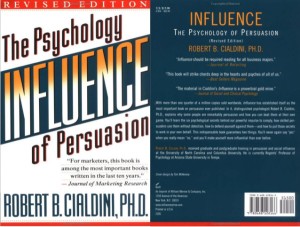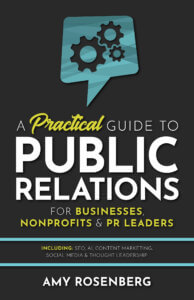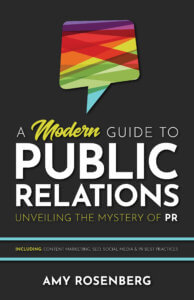As a senior psychology major at Lewis and Clark College, I love experimenting and examining how people think. I approached Veracity seeking an internship for my capstone class. Given complete freedom by my professor in choosing a workplace setting, I decided to explore a nontraditional psychology career—marketing and public relations. In a twist of fate, Amy Rosenberg, Veracity’s co-owner had also been a psychology major and was excited to help me in my experiment to discover how psychology can influence public relations.
Although not being a PR or journalism student was a challenge, it created the opportunity for me to think outside of the box. By using my psychology background I was able to apply psychological concepts to PR. One major concept is persuasion. Everyone from the ancient Greeks performing the new civic art form of rhetoric to public relations professionals sealing another deal use persuasion in some way. This everyday task has transformative power, particularly in the business world which is driven by interpersonal relationships. Marketing professionals use persuasion in many situations, like managing crises, running successful social media campaigns, getting new clients, and gaining support from their colleagues.
Psychologist Robert Cialdini describes six tools of persuasion which include liking, reciprocity, social proof, consistency, authority, and scarcity. By actively knowing and understanding these psychologically-rooted principles, marketing professionals can bring scientific knowledge to their work, ultimately making their business stronger. Here I share his wisdom and apply it to public relations:
 1. Liking: “People like those who like them.”
1. Liking: “People like those who like them.”
I bet you find yourself doing more things for people you like. Well-liked people and businesses have more persuasive power.
Business Application Tips:
- Find commonalities with clients or the press. Physical and nonphysical similarities draw people together so this will make them remember important information and be more easily persuaded. LinkedIn is one example of this principle in use. Information such as shared organizations and educational backgrounds link similar people together publicly, serving as a shortcut to finding commonalities.
- Be aesthetically pleasing; maintain a professional appearance.
- Have a positive demeanor and body language — this makes you more approachable.
- Praise others — making genuine, appreciative comments towards a coworker or client makes one look for the good traits in others as well as generating compliance.
2. Reciprocity: “People repay in kind.”
People feel indebted to those that help or agree with them. Reciprocity is ingrained in our culture — this is why you feel yourself smiling at someone that has just smiled at you
Business Application Tips:
- Give gifts. Not to be confused with bribery, this tactic shows the recipient you are thinking of them and can be as simple as a cup of coffee or thank you letter.
- Let others persuade you. In a more sophisticated application, reciprocity also applies to concessions people give one another. If a large request is denied, and then the negotiator makes a concession by retreating to a small request, concession from the other party is likely to follow.
- Follow the golden rule: Treat others how you want to be treated.
- Self-disclose (share about yourself) to gain increased comradery among colleagues and clients. In one research study subjects reported greater liking, closeness, perceived similarity, and enjoyment of the interaction after engaging in reciprocal self-disclosure than those who did not talk about themselves.
3. Social Proof: “People follow the lead of similar other.”
Ever see huge lines going into bars or restaurants, only to discover later that the place isn’t at capacity? Ever find yourself laughing along to a laugh track on a TV show even though it’s not really that funny? These are all examples of the power of social proof. If everyone else is laughing or waiting in line then it gives the illusion of being merit to it.
Business Application Tips:
- Use social media. In a staggering 61 million subjects study on Facebook experimenters found that those who were showed what pages their friends liked were more likely to like those same pages.
- Harness the power of the majority; highlight a message that is perceived as a majority viewpoint. People simply may just need the verification that their peers like something in order to be persuaded.
- Use testimonials to find new clients. They serve to show an audience what other clients liked about a business. Persuasive power lies in the opinions and affirmations of many people.
4. Consistency: “People will align with their clear commitments.”
Humans have a tendency to want to appear consistent in front of other people. Most people, once they have taken a stand or publicly announced their position will stick to it.
Business Application Tips:
- Have people write things down. Research has shown that people who remain consistent in both verbal and written form are more likely to follow through.
- Start with a small request. Commonly called the “foot in the door technique,” this is accomplished by asking a small request before a larger one. People are more likely to comply with a large request if they have already done something for you before.
- Support a worthy cause. An alternate kind of communications strategy is a social cause campaign where the persuader invests in and promotes social initiatives. This creates a favorable association in the minds of audiences and makes them more easily persuaded if they are sympathetic to the cause. By not associating or listening to an entity that has similar values, their commitments are not consistent. People prefer to back ideas and organizations that they believe in.
- Use familiar language and sayings to introduce new ideas. Consistency can also be viewed as a shortcut which reduces complex thinking. One study used well-known phrases such as: “putting your eggs in one basket” as a cue to persuade subjects. When subjects heard ads with these familiar phrases, they were more likely to buy the product.
5. Authority: “People defer to experts.”
If an expert gives the public a shortcut it is easier to believe them than commence the research on their own. Specialized knowledge in legal, financial, medical or technological realms often require a lot of background, so there is no other choice but to rely on the experts.
Business Application Tips:
- Use an expert to relay your message. A single expert opinion news story has been found to shift public opinion 2%.
- Have supporting arguments. To maximize persuasive potential pair an expert speaker with supporting arguments.
- Look professional and have self-confidence. A famous example of the role of authority in getting people to follow directions is Stanley Milgram’s classic and controversial study of authority and obedience. Subjects would give electrical shocks to other participants if ordered to do so by a perceived authority figure. Business professionals should not seek to intimidate with false authority, authority can be conveyed through self-confidence.
- Showcase your expertise. Displaying credentials in your office, or describing how you solved a similar problem to clients and colleagues. Make sure your LinkedIn profile is up to date, displaying all of your talents and qualifications
6. Scarcity: “People want more of what they’ll have less of.”
The grass is always greener on the other side.
Business Application Tips:
- Frame information in terms of loss. Framing an argument or offer to a client in terms of missing out on an opportunity interests people more.
- Make people feel unique. Business professionals should not overlook the uniqueness of clients and their desire to feel different than others in a socially acceptable way. A possible method of utilizing this finding is to make one’s business client-centered and tailor to their unique needs.
- Highlight the popularity of something: What’s in high demand appears to be found more valuable.
Summary
As a psychology student turned marketing intern, Cialdini’s six principles helped me better understand how PR works. Using a multidisciplinary approach to marketing can make one’s work even stronger and hone the skills already present. PR is all about relationships between people and knowing the best way to persuade is an ingenious fast-track to success.






